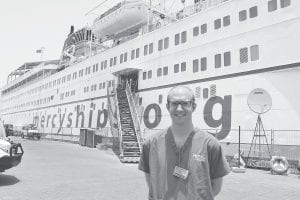Jeremiah Harvey, the son of Pastor Dave and Gayle Harvey of Grand Marais, is a crewmember on the Africa Mercy Ship. Since March 2013, Jeremiah has served as one of the two radiology technologists aboard the ship. The Mercy Ship, which is equipped with operating theaters, a recovery ward, CT scanner, X-ray machines and a laboratory, visits countries considered to be the poorest of the poor. The Mercy Ship provides medical care that would not be available otherwise.

He shares a small room with three bunkmates, but Jeremiah Harvey doesn’t mind. He has a cot and small dresser, and hopefully room for a surfboard behind the cot.
“They just docked in the Canary Islands and Jeremiah found out there is good surfing nearby. He’s hoping he has room for a surfboard that can be stored behind his cot, but those rooms on the ship are really tiny,” said his father Dave Harvey, who pastors the Evangelical Free Church in Grand Marais.
Those cramped living quarters are aboard the Africa Mercy Ship. Jeremiah has been a member of the crew since March. He joined more than 450 volunteers who came from more than 30 nations to serve the poorest of the poor.
Mercy Ships offer hope to sick or injured people who, in many cases without the floating hospital, wouldn’t receive the help they need. Jeremiah is one of two radiologic technologists on board.
“One of the core values here is to serve and love others, especially the forgotten poor,” said Jeremiah. “And I thought that was something to be part of.”
The United Nations Human Development Index ranks the countries served by the Africa Mercy Ship as the poorest countries in the world.
Currently there is only one Mercy Ship, the flagship Africa Mercy, but it is a giant floating hospital that at 500 feet in length and 16,500 tons is larger than the three previous Mercy Ships combined.
Jeremiah worked for two years at the Cook County hospital. During his free time here he worked out at the Pump House Fitness Center and liked to ride mountain bikes. Before moving to Cook County he lived and worked in Hawaii for four years, honing his medical skills and learning to surf.
“I’ve heard there is surf in the Congo and am excited to find out! Plus you don’t need more than a swimsuit and won’t come out with icicles hanging from your beard. Hats off to the North Shore surfers though. Something I never tried, maybe I’m not as adventurous as I thought,” Jeremiah said.
All volunteers must go through a training process before coming aboard. Jeremiah’s first assignment was in Conakry, Guinea, in West Africa where language was a barrier at times, but day workers who lived in Conakry helped translate. Hand and body signals were also used to communicate.
“Many patients are shunned from the societies they live in because of deformities. If they can realize the ship’s cook, engineer, and surgeon are only there because they care, then the healthcare is secondary.
“I thought one of the biggest challenges was going to be looking at patients with obvious deformities and not knowing what to do or say. That hasn’t been the case. It’s really cool that healthcare workers are given this gift to notice what needs attention yet do it without cringing. I look at some of the nurses on board and am amazed at how much care and compassion they give these patients day in and day out,” said Jeremiah.
The ship pulled up anchor from Conakry in June and is currently being resupplied and undergoing maintenance in Las Palmas, Gran Canaria, before heading to Pointe Noire, Congo.
Leaving port, said Jeremiah, “is bittersweet. We could have stayed for years and years and not met the needs of the country.”
Once the ship arrives in Pointe Noire it will anchor for about 10 months.
Harvey committed to a two-year assignment. Because no one is paid, he had to raise funds and pay out of his pocket to afford his living expenses. “I have budgeted for $1,000 a month. Being on board isn’t that expensive, but once you add travel to and from Africa and medical insurance, it starts to add up,” Jeremiah said.
The ship’s hospital keeps a Monday through Friday 8 a.m. to 5 p.m. schedule. Weekends are available for exploration and finding fun, like surfing.
“You would have to try very hard not to make friends on this ship. So far it has been great getting to know the others on board,” said Jeremiah adding, “That being said, I’d say the biggest challenge is being on a ship of 400 trying to find somewhere to retreat after a tiring day. You almost have to put up a sign ‘Quiet time – do not disturb.'”
Begun in 1978 by Don and Deyon Stephens of Garden Valley, Texas, Mercy Ships provide free health care and offer preventive health education, mental health programs, agriculture projects, and palliative care for terminally ill patients.
The lower deck of the Africa Mercy is equipped with six operating theaters, a 78-bed recovery ward, a CT scanner, an X-ray machine and a laboratory. During 2011 while docked in Sierra Leone the Africa Mercy crew performed more than 3,000 surgeries, 27,800 general medical and eye consultations, 2,600 eye operations and 34,700 dental procedures.
Volunteers include surgeons, dentists, nurses, engineers, cooks, teachers, machinists, welders, plumbers, electricians and agriculture workers, and volunteers often end up giving blood because there is always limited space to maintain a blood bank on board.
Harvey said, “It’s a great place to use your skills you’ve learned through the years. There is plenty of opportunity to develop new skills, including how to communicate and adapt in a very new environment. I felt that this is where I’m supposed to be, and I would encourage others, if they think this is something they might want to do, to look into it.”


Loading Comments